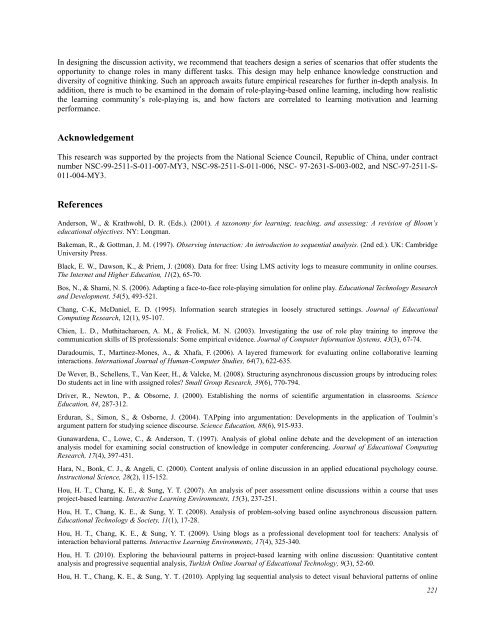January 2012 Volume 15 Number 1 - Educational Technology ...
January 2012 Volume 15 Number 1 - Educational Technology ...
January 2012 Volume 15 Number 1 - Educational Technology ...
Create successful ePaper yourself
Turn your PDF publications into a flip-book with our unique Google optimized e-Paper software.
In designing the discussion activity, we recommend that teachers design a series of scenarios that offer students the<br />
opportunity to change roles in many different tasks. This design may help enhance knowledge construction and<br />
diversity of cognitive thinking. Such an approach awaits future empirical researches for further in-depth analysis. In<br />
addition, there is much to be examined in the domain of role-playing-based online learning, including how realistic<br />
the learning community’s role-playing is, and how factors are correlated to learning motivation and learning<br />
performance.<br />
Acknowledgement<br />
This research was supported by the projects from the National Science Council, Republic of China, under contract<br />
number NSC-99-2511-S-011-007-MY3, NSC-98-2511-S-011-006, NSC- 97-2631-S-003-002, and NSC-97-2511-S-<br />
011-004-MY3.<br />
References<br />
Anderson, W., & Krathwohl, D. R. (Eds.). (2001). A taxonomy for learning, teaching, and assessing: A revision of Bloom’s<br />
educational objectives. NY: Longman.<br />
Bakeman, R., & Gottman, J. M. (1997). Observing interaction: An introduction to sequential analysis. (2nd ed.). UK: Cambridge<br />
University Press.<br />
Black, E. W., Dawson, K., & Priem, J. (2008). Data for free: Using LMS activity logs to measure community in online courses.<br />
The Internet and Higher Education, 11(2), 65-70.<br />
Bos, N., & Shami, N. S. (2006). Adapting a face-to-face role-playing simulation for online play. <strong>Educational</strong> <strong>Technology</strong> Research<br />
and Development, 54(5), 493-521.<br />
Chang, C-K, McDaniel, E. D. (1995). Information search strategies in loosely structured settings. Journal of <strong>Educational</strong><br />
Computing Research, 12(1), 95-107.<br />
Chien, L. D., Muthitacharoen, A. M., & Frolick, M. N. (2003). Investigating the use of role play training to improve the<br />
communication skills of IS professionals: Some empirical evidence. Journal of Computer Information Systems, 43(3), 67-74.<br />
Daradoumis, T., Martinez-Mones, A., & Xhafa, F. (2006). A layered framework for evaluating online collaborative learning<br />
interactions. International Journal of Human-Computer Studies, 64(7), 622-635.<br />
De Wever, B., Schellens, T., Van Keer, H., & Valcke, M. (2008). Structuring asynchronous discussion groups by introducing roles:<br />
Do students act in line with assigned roles? Small Group Research, 39(6), 770-794.<br />
Driver, R., Newton, P., & Obsorne, J. (2000). Establishing the norms of scientific argumentation in classrooms. Science<br />
Education, 84, 287-312.<br />
Erduran, S., Simon, S., & Osborne, J. (2004). TAPping into argumentation: Developments in the application of Toulmin’s<br />
argument pattern for studying science discourse. Science Education, 88(6), 9<strong>15</strong>-933.<br />
Gunawardena, C., Lowe, C., & Anderson, T. (1997). Analysis of global online debate and the development of an interaction<br />
analysis model for examining social construction of knowledge in computer conferencing. Journal of <strong>Educational</strong> Computing<br />
Research, 17(4), 397-431.<br />
Hara, N., Bonk, C. J., & Angeli, C. (2000). Content analysis of online discussion in an applied educational psychology course.<br />
Instructional Science, 28(2), 1<strong>15</strong>-<strong>15</strong>2.<br />
Hou, H. T., Chang, K. E., & Sung, Y. T. (2007). An analysis of peer assessment online discussions within a course that uses<br />
project-based learning. Interactive Learning Environments, <strong>15</strong>(3), 237-251.<br />
Hou, H. T., Chang, K. E., & Sung, Y. T. (2008). Analysis of problem-solving based online asynchronous discussion pattern.<br />
<strong>Educational</strong> <strong>Technology</strong> & Society, 11(1), 17-28.<br />
Hou, H. T., Chang, K. E., & Sung, Y. T. (2009). Using blogs as a professional development tool for teachers: Analysis of<br />
interaction behavioral patterns. Interactive Learning Environments, 17(4), 325-340.<br />
Hou, H. T. (2010). Exploring the behavioural patterns in project-based learning with online discussion: Quantitative content<br />
analysis and progressive sequential analysis, Turkish Online Journal of <strong>Educational</strong> <strong>Technology</strong>, 9(3), 52-60.<br />
Hou, H. T., Chang, K. E., & Sung, Y. T. (2010). Applying lag sequential analysis to detect visual behavioral patterns of online<br />
221

















